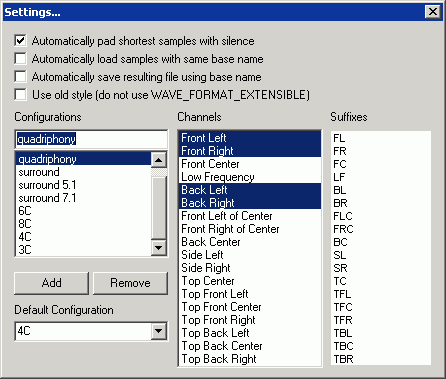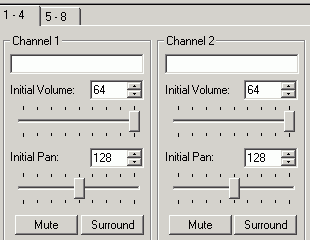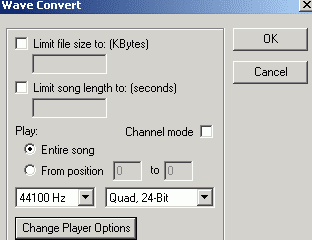The practical side
|
A doubling of the stereo-installation is needed in the first place. So two more speakers with another stereo-amplifier. And of course the sound source must have 4 discrete outputs. Recorder, computer, mixer, etc. The 4C medium I knew for years, that a WAV file was capable of containing more tracks than 1 or 2. See Description But nothing was done with it. Overtaken by the consument hype of Dolby surround. See Wikipedia Double stereo First, I solved this by making two stereo-wavs, 1 for Down and 1 for Up, being played simultaneously. I couldn't afford a multi-channel soundcard, so I did this with two stereo-soundcards in the PC. Then, in the multitrack mixer, I could assign one stereo to 'output device 1' and the other stereo to 'output device 2'. The Multichannel WAV format Then I finally found a program to make multichannel wav files : Multiwave by Nicolas Fournel. Now I can assign 4 mono tracks to 4 chosen output channels to render them into a quad WAV : |

|
| Terms based on the horizontal surround idea, so with Front en Back L/R, but that doesn't matter for the WAV realisation. |
 |
|
ModPlug Tracker Another source for quad WAVs appeared to be ModPlug Tracker (see Links-page for downloads and info). It can export such a file via the .IT or .MPTM format. Of the whole song, or of selected channels. |


|
|
The 'Surround' button defines, per channel, whether the output is rendered to tracks 1 and 2, or to tracks 3 and 4. If a panning-position between 1-2 and 3-4 is needed, it is possible by duplicating the relevant channels to new ones in the pattern. Of course after adjustment of the two channel volumes to keep the maximum the same. Playing back with computer First of all the windows-configuration for audio-output needs to be set to 4 speakers. This seems to be functioning correctly so far with : JetAudio - Here is a 4C test file to hear if the channels are accordingly reproduced. It even appears, that for this reproduction no second soundcard is needed, because, to my surprise, the Soundblaster Live! card with its outputs 3 and 4, is capable of producing the discrete 4 outputs straightforward. So the second soundcard is not needed for playback anymore (but still for 4C-recordings). Quasi 4C For years, I use a system, extracted from a SQ-decoder, to change any stereo-source into virtual four channels. The circuits for this can be found here The BC 414 transistor is used for its low-noise. And I used quality resistors and capacitors, with low tolerance range. |
Back